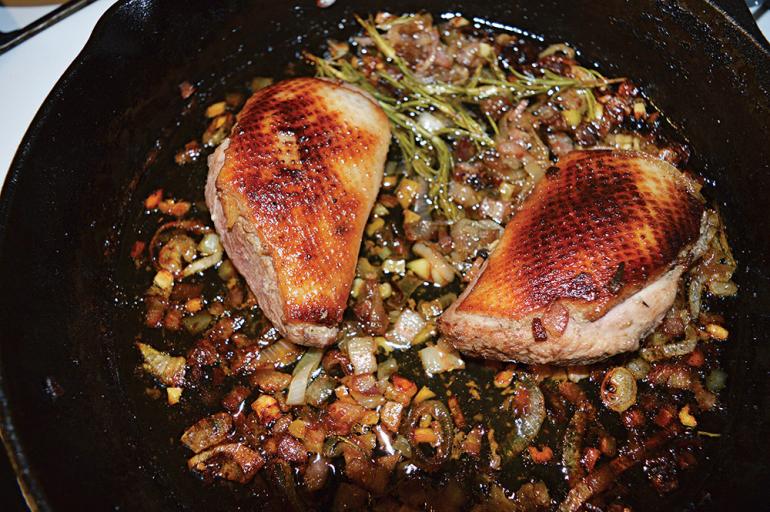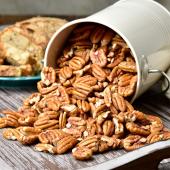Recipe: Dive-Bar Duck
A fowl-proof recipe.
At 3am the door swung open. “I’ve waited a long time for this,” I heard, as I wiped my eyes. I gained consciousness and noticed wading boots and a shotgun I hadn’t seen before. “Today’s your first duck hunt.”
I’d accompanied Dad in the past, but this was my first time carrying a gun. I was 12 years old and full of excitement. This was the first of many unforgettable trips, several of which are still my fondest memories. My father was a gruff man who took pride in teaching me the outdoors and the value of subsisting off the land.
The jonboat was full of decoys and blind material—my dad knew exactly where to find the diver ducks. As the sun began to rise, so too did my eagerness to please my father. We managed a few mergansers and redheads, but the clearest memory was of Dad taking me to his local watering hole to brag to his friends afterward.
That particular bar was always full of hunters and fishermen. The smells of fish slime and cigarettes permeated the air. The patrons seemed like they must have been the toughest men on earth, but they all slapped my back and congratulated me on my initiation.
Many people refer to diving ducks as foul, unpleasant, and even downright despicable, but I’m hoping you will find a newfound admiration for “divers” with this recipe, which uses some easy tricks to cover up those coarse flavors. It evokes savory tastes that you might encounter at a hole-in-the-wall backwoods bar, and the reduction requires some of your favorite dark beer. Choose wisely.
While my father has passed away, his memory lives on in the values he taught me through hunting and our celebratory trips to the watering hole. This recipe pays homage to everything he instilled in me through our decades of shooting and laughing and bellying up to dive bars together.
The Brine (for 1/3-lb. bird)
1/2 Tbsp. whole cloves
1/2 Tbsp. juniper berries
5 sprigs rosemary
5 sprigs thyme
1/2 cup fresh chopped ginger
1/2 cup salt
The Reduction
12 oz. dark beer
1 cup granulated honey or cane sugar
3 Tbsp. honey
3 sprigs rosemary
The Marinade
1 large shallot, thinly sliced
5 cloves garlic (crushed)
8 whole cloves (or crushed juniper berries)
4 sprigs rosemary
2 Tbsp. of honey
Enough olive oil to cover
1 cup smoked bacon or pancetta
1 Tbsp. butter
Directions
I prefer to pluck the duck, because I enjoy cooking the other parts confit (in its own fat) or boiling them down for stews and stocks. After plucking, immediately prepare the brine to soak the breast in for at least 24 hours, refrigerated. This allows it to release the fishy flavors commonly associated with divers, as well as absorb some great herbal tones. It also tenderizes the meat by breaking down proteins. A day later, remove the meat from the brine and roll it up in a paper bag. Put it back in the fridge and let it sit for another 24 hours to allow the outside of the bird to dry, while keeping moisture inside the duck.
Let the breast sit covered in the marinade for at least three hours, allowing the flavors to penetrate. In a cast-iron skillet, combine one tablespoon of butter, one chopped shallot, and a couple pieces of pancetta or smoked bacon. Sauté over medium heat until the shallots begin to turn translucent, then add the duck breast with marinade. Slightly brown the skin side of the duck, place in the oven at 400 degrees, and cook until medium rare. A great addition to the duck breast is latkes—potato cakes cooked in the duck fat—or pineapple coated with ginger, cayenne, and smoked paprika—grilled or baked.
Calvin Josey is an avid outdoorsman and conservationist. His company, Primal Cooking, specializes in wild-game preparation and dehydrated backpacking meals.













